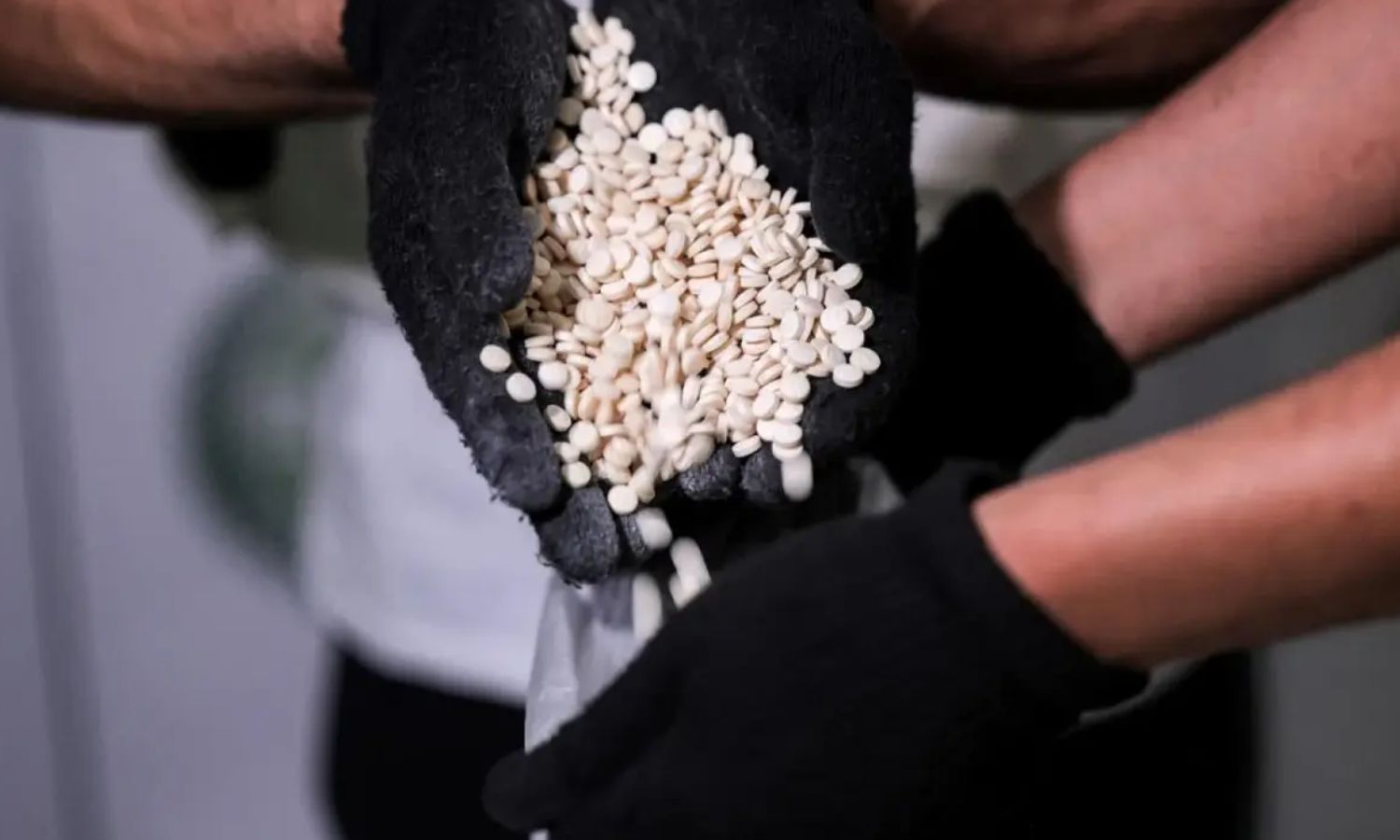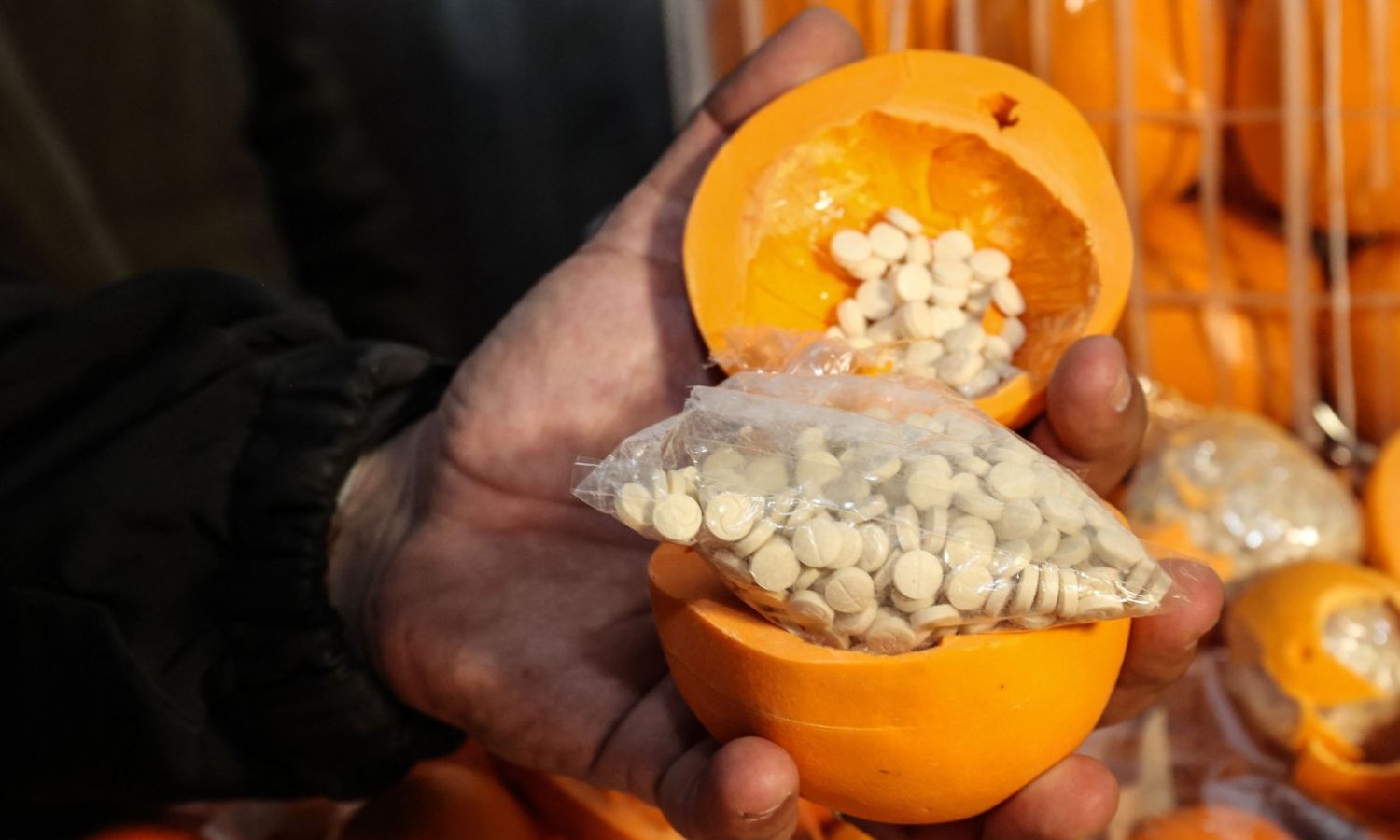Jana al-Issa | Hassan Ibrahim
The anti-narcotics bill to disrupt and dismantle the Syrian regime-run drug trade was born after difficult labor between chambers and legislative assemblies in the United States of America. In 2021, the US House of Representatives (Congress) ratified the draft, which was later disregarded during the Conference Committee’s negotiations.
It was approved by the US House of Representatives again in September 2022 and ratified by the House on 8 December 2022 with an overwhelming majority vote. The bill then moved to the US Senate and then to the US president, Joe Biden, who signed the US defense budget for the fiscal year 2023, including the law, on 23 December 2022.
According to its provisions, the law aims to disrupt and dismantle the drug production networks associated with the head of the Syrian regime, Bashar al-Assad, who has transformed Syria into a fully equipped place for the manufacture of narcotic drugs, sealing and processing them for export, and then bringing them to smuggling networks for sale outside the country.
It is not clear whether the new legislation is similar in effect to its predecessors, such as the Caesar Act and Assad’s Fortune, or whether it will end up personally placing Bashar al-Assad on the wanted list, as it did with General Manuel Noriega, de facto governor of the Republic of Panama in the 1980s, who was initially on good terms with the US Central Intelligence Agency (CIA) as an officer and politician, and wound up arrested and imprisoned by the very agency on drug trafficking charges.
In this file, Enab Baladi discusses with experts familiar with US administration policies the feasibility of actually applying this law and its political and logistical impact on the Syrian regime.
American Law versus the “Captagon regime”
The American law requires the “disruption and dismantling of drug production and trafficking networks associated with Assad,” submitting a written strategy to “relevant congressional committees” no later than 180 days from the date of enactment of this law. This strategy must be presented by the Secretary of Defense, the Secretary of State, the Secretary of the Treasury, the Administrator of the Drug Enforcement Administration, the Director of National Intelligence, and the heads of other appropriate Federal agencies.

Officers of the General Directorate of Narcotics Control of the Saudi Ministry of Interior carrying Captagon pills seized during a special operation in the coastal city of Jeddah – 1 March 2022 (AFP)
Such strategy shall include each of the following:
* A strategy to target, disrupt, and degrade networks that directly or indirectly support the narcotics infrastructure of the Assad regime, particularly through diplomatic and intelligence support to law enforcement investigations and to build counter-narcotics capacity to partner countries through assistance and training to law enforcement services in countries, other than Syria, that are receiving or transiting large quantities of Captagon.
* Information relating to the use of statutory authorities, including the Caesar Syria Civilian Protection Act of 2019, the Foreign Narcotics Kingpin Designation Act (popularly referred to as the “Kingpin Act”), section 489 of the Foreign Assistance Act (relating to the international narcotics control strategy report), and associated actions to target individuals and entities directly or indirectly associated with the narcotics infrastructure of the Syrian regime.
* Information relating to the use of global diplomatic engagements associated with the economic pressure campaign against the Assad regime to target its narcotics infrastructure.
* A strategy for leveraging multilateral institutions and cooperation with international partners to disrupt the regime’s narcotics infrastructure.
* A strategy for mobilizing a public communications campaign to increase awareness of the extent of the connection of the Assad regime to illicit narcotics trade.
* A description of the countries receiving or transiting large shipments of Captagon, and an assessment of the counter-narcotics capacity of such countries to interdict or disrupt the smuggling of Captagon, including an assessment of current United States assistance and training programs to build such capacity in such countries.
The law stipulates that this report be submitted in an unclassified form but may contain a classified annex. Each of the “relevant congressional committees,” namely the Committee on Armed Services, the Committee on the Judiciary, the Committee on Foreign Affairs, the Committee on Financial Services, the Committee on Appropriations, and the Permanent Select Committee on Intelligence of the House of Representatives, should be presented with the said report.
The aforementioned report shall also be presented to the Committee on Armed Services, the Committee on the Judiciary, the Committee on Foreign Relations, the Committee on Banking, Housing, and Urban Affairs, the Committee on Appropriations, and the Select Committee on Intelligence of the Senate.
Implementation necessitates a law
The political researcher specializing in American affairs, Ruwan al-Rejoleh, said in an interview with Enab Baladi that what was ratified by the US President, Joe Biden, regarding the fight against drugs run by al-Assad is an endorsement of a draft law related to developing a strategy to disrupt and dismantle the Captagon network, and reinforcing the capacities of affected countries to combat operations through diplomatic channels, training, and rehabilitation of their cadres.
Al-Rejoleh made it clear that the law matter is certainly serious but needs years to be implemented since, within six months, the strategy must be presented. However, any new representative (lawmaker) could block the project, and implementation of the strategy after it had been drafted would require another bill.
Financial and political support, Better results
Regarding the feasibility of this law should it be implemented after the strategy was presented, the former US State Department Advisor, Hazem al-Ghabra, said that the war on drugs is very challenging, and the United States has already experienced it in South America with a slightly similar situation to the Syrian situation, but less bad; there was some government and state support for drug producers. But what is happening in Syria today is much worse, according to his description.
Speaking to Enab Baladi, al-Ghabra explained that the competent US agencies monitor the issue of drugs in Syria on a regular basis, collect information through intelligence means, and concoct practical plans for it. With this law, there is greater support for these actors, whether financial or political, and they will be able to operate faster and more efficiently in order to try to disrupt these networks.
What the said law will provide, according to al-Ghabra, is more resources, information, and means of sharing information with US partner countries, to limit the Syrian regime’s ability to export drugs in the region.
These resources include intelligence information, satellite tracking, telephone surveillance, movement control, vehicles, and the use of drones. He pointed out that all that needed effort, time, staff, and, most importantly, funds. Here, the importance of the law is that it will provide funds and support to those who will undermine the drug export network.
Al-Ghabra said that 180 days are enough to develop a strategy and a plan to strike the Syrian regime and other parties in Syria and the region producing and distributing drugs globally.
These efforts, which will be pursued in accordance with the said American law, may collide with the Syrian regime’s failure to respond. The American experience and anti-drug tendency rely on working with neighboring countries on the one hand and with the Syrian regime on the other, which in turn has nothing to lose by refusing to bow to American laws.
|
The Syrian state almost fully supports the production and distribution of narcotic drugs and views them as a source of income for it and for individuals representing or benefiting from the regime. It is very difficult to stop the production and smuggling of drugs in a country where the state is directly responsible for it. Hazem al-Ghabra, Former US Department of State Advisor |
For his part, a member of the Syrian-American Congress on the National Charter’s Follow-up Committee, Pr. Khaldoun al-Aswad believes that this strategy is not sufficient to disrupt the Syrian regime’s production of drugs. This is historically proven, which is that the war on drugs in South America has not been successful since 1970 until now. However, the aim of the law is to establish legal safeguards, standards, and a strategy for holding al-Assad accountable on legal grounds when the time is right.
Speaking to Enab Baladi, al-Aswad explained that the importance of the law lay in the fact that it mentioned al-Assad by name and that al-Assad had become a “justice fugitive” rather than a head of state. In the near future, he could be arrested and tried as a global drug dealer. This had historically happened before with Manuel Noriega, who was the leader in Panama and was arrested and prosecuted by the United States as a drug dealer.

Fake oranges filled with Captagon pills seized by the Lebanese customs in the Port of Beirut – 29 December 2021 (AFP)
Collision with the “Drug Kingpin”
“In addition to regularly committing war crimes against his own people, the Assad regime in Syria is now a Narco-state,” said the US Rep. French Hill shepherding the anti-drug bill.
“The Assad-controlled territories are now an epicenter for the drug trade,” Hill added.
During the House of Representatives session that included the approval of the draft, Hill added that if the United States did not work with its like-minded partners to first hinder the narcotics trade and replace it with a working system of institutions that serve the Syrian people, Assad would, in fact, add the title “Drug Kingpin” to his global recognition status as a “leading mass murderer.”
Over the past years, there have been reports of competent authorities and press investigations based on evidence indicating Syria’s transformation by the Syrian regime and its associates into a Narco-State for producing and manufacturing narcotic drugs and trafficking them through export to various countries of the world.
Several specialized studies have agreed that the volume of Syrian drug exports makes it one of Syria’s most important foreign exchange sources. The Shadow Economy, which reached about 200% of the official economy in 2021, has been boosted, according to research estimates. In 2010, it was estimated at 20% of the Gross Domestic Product (GDP).
A study released by the Center for Operational Analysis and Research (COAR) at the end of April 2021 showed that Syria has become a global epicenter for the production of narcotic Captagon and has grown more industrialized and technologically advanced in the industry than ever before. With the regime losing most of its foreign exchange resources, the American law, which by content seeks to end this trade and pressure the regime at various levels, raises questions about the extent to which the regime has been affected by this strategy and its impact on the volume of narcotics trade it manages.
The Syrian researcher and expert on Middle East affairs, Lama al-Atassi, told Enab Baladi that the enactment of the said American law “would constitute a devastating blow to the regime and its networks.”
Al-Atassi believes that the economy of Bashar al-Assad’s war against the Syrian people is based on sources of financing obtained from the production and export of Captagon. Consequently, the enactment of the law would be a slow strangulation of the regime and all its beneficiaries.
On the other hand, former US State Department Advisor Hazem al-Ghabra considered that, economically, the regime no longer has anything to lose, so the law may actually lead to an increase in the volume of drug production in Syria. Further restriction on drug exports would drive the regime to produce more and try to smuggle more, he explicated.
For his part, Pr. Khaldoun al-Aswad believes that the law will provide legal ground for holding al-Assad, his allies, and those who support and contribute to the drug trade associated with him, accountable. Al-Assad’s ability to reap the huge profits he currently receives can be challenged, and he uses it to finance his military and war machine against the Syrian people. Thus, the law may be able to weaken al-Assad’s repression machine.
|
The Syrian regime is illegitimate and does not act legally. It has been acting as a gang for some time and knows how to evade these laws. But its room for maneuvering is narrowing, and criminal regimes like the al-Assad regime always try to evade international laws and procedures. Pr. Khaldoun al-Aswad, Member of the Syrian-American Congress on the National Charter’s Follow-up Committee |
Politically, it may be affected
Campaigns for normalization with the Syrian regime continue to increase year after year, indicating that the “bad” reputation of the Syrian regime is not linked to the production and trade of drugs, with some countries normalizing their relations with it.
At the beginning of 2022, the head of the Syrian regime, Bashar al-Assad, visited the UAE, the first visit of its kind to an Arab country since 2011, and Turkey’s relations with him witnessed remarkable transformations with a Russian push.
In November 2021, the American The National Interest website reported that the Captagon trade has rapidly accelerated into a regional Mediterranean challenge that demands increased attention from the United States and its regional partners.
“It is crucial that the amendment to the 2022 NDAA receives bipartisan support as a testament to the United States’ interest in countering a regime and a narcotics trade that has come to terrorize so many,” according to the report.
Despite limited Drug Enforcement Administration (DEA) efforts in joint investigations and intelligence-sharing with Captagon destination and transit countries, the United States and its allies lack a coordination mechanism—let alone a shared strategy—to manage the Captagon trade, The National Interest added.
Furthermore, the accelerating normalization of an Assad-controlled Syria among regional governments and even intergovernmental organizations such as Interpol has made it increasingly difficult to counter, let alone monitor, the Captagon trade, the report revealed.
The 2022 NDAA amendment’s proposal for an interagency strategy between the Department of State, Department of Treasury, Department of Defense, DEA, and other federal agencies, as well as an awareness campaign promoting accountability among Captagon’s illicit actors, should be a necessary step to countering the Captagon trade and strengthening the 2020 Caesar Act without having to pile on additional sanctions, The National Interest concluded.
Hazem al-Ghabra, former advisor at the US State Department, considered that from a political point of view, it is difficult for the Syrian regime to be affected more than the current stage and for a scenario in which its reputation becomes worse than it is now.
Al-Ghabra added that the American focus on the drug issue might lead to the dissemination and sharing of intelligence information that could harm the situation of the Syrian regime with countries that may have initial perceptions of restoring their relations with it.
The Syrian researcher, Lama al-Atassi, considered that the Syrian regime would also receive a political blow, which may be more with leftists in Europe.
Al-Atassi believes that the regime worked politically, in coordination with Iranian “lobbies” in Europe and the United States, to finance media campaigns and “propaganda,” in which it portrayed the Syrian revolutionaries as “terrorists” and “Islamists,” and it succeeded at times.
Exposing him legally as the head of a drug gang will certainly shake his image before those who are convinced that he has a case, she adds.
|
Achieving a state of complete external constraint on the regime requires an agreed international will to restrict it, and as long as there are countries that support it and deal with it commercially, it will not reduce its production because those countries thus help him (Captagon) smuggling. Lama al-Atassi Researcher in the Middle East affairs |
Additional support for neighboring countries
Since 2013, the neighboring countries of Syria, most notably Jordan, Lebanon, and Iraq, have suffered from the flow of drug shipments to their territories or transit through it to the target countries.
According to US “Captagon Act,” the strategy must include a description of the countries that receive or transit large shipments of Captagon, and an assessment of the ability of the drug control in these countries to intercept or disrupt the smuggling of Captagon, including an assessment of current US assistance, training and assistance programs to build these capacities in these countries.
Al-Ghabra considered that it is difficult to compare the impact of Syria’s neighboring countries on the American step in the fight against drugs, as Jordan, for example, is mainly affected by drug production in Syria, while the situation is different in Lebanon, which as a government, state and army are considered a US partner against the networks of promotion, production, and export.
While the Lebanese Hezbollah, in addition to Lebanese persons and entities located in or outside the Hezbollah-held areas, is considered an essential part of the Captagon trade.
Al-Ghabra stressed that the American law would definitely put more pressure on the governments of neighboring countries, most notably Lebanon.
“There will also be more cooperation between the American and Jordanian sides in this context, regarding drug trade and Captagon in particular, and increasing intelligence cooperation and information sharing,” the former advisor added.
“Al-Assad’s Wealth,” a previous disappointing law
In 2021, US President Joe Biden signed Bill “1605” to authorize national defense for the fiscal year 2022, which included in its paragraphs submitting a report on the estimated net worth and known sources of income for the head of the Syrian regime, Bashar al-Assad, and his family members (his wife, children, siblings, and the maternal and paternal cousins).
Despite the delay in the issuance of the report from the time specified for it within the mandate, it received many criticisms after its issuance.
It was represented by the fact that its results relied on open sources available on the Internet, or that the wealth figures were not accurate at all but estimated, within a wide range, as the report said that the net worth of the al-Assad family ranges between one and two billion US dollars.
Based on the results of the “Assad’s Wealth” law, questions are raised about the fate of the results of the Anti-Narcotics Law and the extent to which useful results can be reached.
A political researcher specializing in American affairs, Ruwan al-Rejoleh, said that, until now, there is nothing obligating the US administration to combat the drugs administered by al-Assad, and since it was approved within the US defense budget, it is only obligated to develop a strategy to combat it.
The Jusoor Center for Studies reported on 28 December 2022 about the mechanisms the US administration is expected to resort to in the context of the anti-drug strategy.
The research center indicated that the US institutions authorized to enforce the anti-drug law may resort to several measures, including the approval of a package of international sanctions against the regime, to put more pressure on it with the aim of changing its behavior.
Caroline Rose, a Captagon expert and senior analyst and head of the Power Vacuums programme at the New Lines Institute, told The National newspaper there is a chance that the Captagon Act “falls flat” on deliverables without more specific guidance.
“The good news is that the amendment isn’t overly ambitious … the challenge of course is whether this strategy will be enough to disrupt the Syrian government’s involvement in the trade as the amendment instructs,” Rose told The National newspaper.
Rose believes sanctions, such as the landmark Caesar Act, will be “entertained as an option” as the inter-agency process on Captagon unfolds.
“The Assad regime relies on this trade as an alternative cash flow amid the economic hit of sanctions, using it as a loophole, so it is likely that US policymakers will seriously examine potential sanctions,” Rose said.
The Captagon expert told The National that new sanctions are particularly important in addressing those involved in the drug trade with links to the Syrian government that are not yet included in current US sanctions.
if you think the article contain wrong information or you have additional details Send Correction
النسخة العربية من المقال
-
Follow us :













 Head of the Syrian regime, Bashar al-Assad (edited by Enab Baladi)
Head of the Syrian regime, Bashar al-Assad (edited by Enab Baladi)





 A
A
A
A
A
A









 More In-Depth
More In-Depth